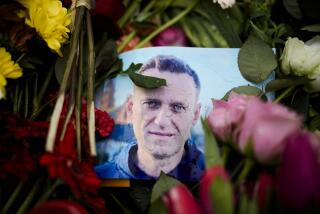Artukovic’s Remains Could Be Cremated
- Share via
ZAGREB, Yugoslavia — The law in the Yugoslav republic of Croatia has been changed to allow the government to dispose quietly of the remains of convicted war criminal Andrija Artukovic after his death, a government spokesman said Thursday.
The Croatian criminal code was amended on Dec. 22 to extend the provisions for quiet disposal of the remains of executed criminals. Under those rules, which now cover prisoners who die of natural causes while under a death sentence, the government may cremate the body and dispose of the ashes as it sees fit, without being obliged to disclose the time or place.
“It’s not just his case but for any case where something like that happens,” the spokesman said, but he acknowledged that the law seems to have been drawn up with Artukovic in mind.
It is believed that the authorities--apparently seeking to avoid creating a martyr to Croatian nationalism--hope to avoid a repetition of the circumstances surrounding the burial of Aloysius Stepinac, the wartime Roman Catholic archbishop of Croatia.
Stepinac was jailed as a collaborator after the Communist takeover and died in internal exile in 1961. He was buried in a place of honor behind the altar at the Cathedral of St. Stephen, where a six-foot-high candle and a bas relief portrait mark the spot, which is adorned with bouquets of fresh flowers.
Meanwhile, defense lawyers moved to block the execution of the 87-year-old Artukovic, formerly of Seal Beach, who was convicted last May of three counts of mass murder and one count of individual murder committed during his four years as interior minister of the Nazi-backed puppet state of Croatia during World War II.
Although a defense attorney said Artukovic’s condition has been declining daily, a Croatian information official said his health is “more or less the same.”
“He was old and sick when he came to Yugoslavia, so we can’t say that his health is good or bad, but more or less not so good,” the spokesman said. “He is in the hospital under care.”
While the government was eager for last year’s extradition of Artukovic, the highest-ranking Yugoslav war criminal ever brought to trial, there appears to be less interest in actually carrying out the sentence of death by firing squad, Yugoslav sources said.
This is because of the possible damage to the country’s reputation stemming from the execution of a sick man, and the concern about creating a martyr to the cause of Croatian nationalism, which authorities see as a possible threat to the Communist regime that has ruled the country since the end of the war.
“They’re being very careful to give him all the medical attention so nobody can say he died of neglect, but the idea is for him to die naturally and not have to shoot him,” one source said.
Croatia is the second most populous of Yugoslavia’s eight republics and provinces and one of its most prosperous, and authorities have been highly sensitive about anything that might prompt a new stirring of Croatian nationalist sentiment.
The wartime Croatian regime killed an estimated 900,000 non-Croatians, primarily Serbs, Jews and Gypsies, between 1941 and 1945. Artukovic, as head of the Interior Ministry, was charged with direct responsibility for hundreds of deaths.
Zeljko Olujic, one of Artukovic’s attorneys, said in an interview Monday that Artukovic is allowed one visit a month and that his condition has declined since the trial.
“He is virtually blind, he doesn’t hear very well, he has problems with his heart and stomach and lungs and he is suffering from senile dementia,” Olujic said.
“He doesn’t know that he’s in Yugoslavia, and he doesn’t recognize me until I explain to him that he is under a death sentence,” the attorney said.
Olujic said doctors told him that Artukovic could live as long as a year but that a minor illness could kill him at anytime.
“The case is still not closed,” the government spokesman said. “The lawyers have used extraordinary legal remedies to apply for a modification of punishment.”
Olujic said there was no indication of when a decision might be reached.
More to Read
Sign up for Essential California
The most important California stories and recommendations in your inbox every morning.
You may occasionally receive promotional content from the Los Angeles Times.













